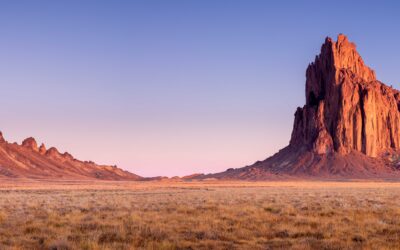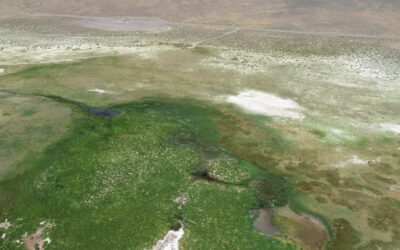DRI’s Justin Huntington coauthored the new study, led by researchers at the University of Montana and the Montana Climate Office, which published mid-December in the Nature Journal Communications Earth and Environment.
The following is the full press release shared by the University of Montana.
MISSOULA – In a groundbreaking study that could reshape our understanding and management of water resources in the Western United States, David Ketchum, a 2023 graduate of the University of Montana systems ecology Ph.D. program, has unveiled a 35-year analysis quantifying the interconnected impacts of climate change and irrigation on surface water flows.
The study, recently published in Nature Communications Earth and Environment, describes the relative impact that climate change and irrigation intensification is having on hundreds of watersheds in the Western United States.
“These findings underscore the importance of addressing the competing uses for water and the ecological trade-offs associated with heavy water use,” Ketchum said.
Trained as a hydrologist in New Mexico, Ketchum has dedicated his career to understanding water supply challenges, particularly in Montana and the broader Western U.S. In 2017, he was recruited by Kelsey Jencso, the W.A. Franke Endowed Professor of Watershed Hydrology and Montana’s state climatologist, to join the UM BRIDGES fellowship to work on advancing methods used to estimate the water usage of agriculture through irrigation. Ketchum is now a hydrologist with the Montana Department of Natural Resources and Conservation.
He and his team conducted research across 221 basins in the Colorado, Columbia and Missouri river systems, challenging existing notions that changes in streamflow are solely attributed to a warming climate. The study reveals that irrigation practices play a crucial role and often surpass climate-induced changes in altering water flows.
Leveraging a machine learning model, researchers supplied tens of thousands of data points derived from irrigated fields. The model, enhanced with advanced algorithms from NASA and the U.S. Geological Survey, analyzed high-resolution satellite data spanning 1986 to 2021, revealing an evolving landscape of irrigation expansion in the Western U.S. This innovative approach allowed the team to distinguish between the impacts of climate change and human activities on streamflow.
“This first-of-a-kind study ascertains both climate change and irrigation impacts on streamflow across the Western U.S,” Jencso said. “It reveals that irrigation can have both positive and negative impacts, serving as a storage mechanism to counter climate-induced streamflow declines in some cases.”
Key findings from the study include altered flows beyond climate change, increased irrigation water use, seasonal flow impacts and basin-specific sustainability classifications.
“This information gives us an idea of how we might manipulate irrigation systems to mitigate stream flow impacts,” Ketchum said. “It represents a starting point to modify our irrigation practices and address the negative impacts of climate change on our water supply.”
He said the study holds significance for large-scale water resource management and serves as a valuable tool for farmers, ranchers and policymakers. The “irrigation efficiency paradox” is a notable aspect, where modern and efficient irrigation systems – while considered water-saving per field – may result in a net increase in water usage at the basin scale.
For farmers and ranchers, this research provides valuable insights into how irrigation systems can be manipulated to mitigate negative impacts on stream flow, he said. By comparing different irrigation types and systems, the study suggests ways to incentivize policy changes for sustainable water management.
Ketchum emphasized the importance of the study’s large-scale approach: “Every place is different, and depending on the unique characteristics of each watershed, our paper implies you could intelligently develop irrigation to minimize impacts on stream level and other water users.”
###
Contact: Elizabeth Harrison, director of communications, W.A. Franke College of Forestry & Conservation, 917-656-9773, elizabeth.harrison@mso.umt.edu.


